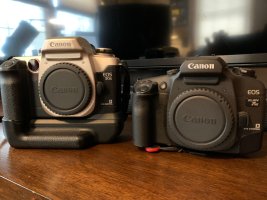Are you implying the last film body launch? The EOS 1v was made until 2010. (debuted in 2000)I have an EOS 30v (Elan 7NE/7S) which is my favourite film camera and the last film camera Canon ever made (2003)
It works well including the eye controlled focus (for me anyway) and I found this feature works best if you use a large eye cup which holds your eye in a fixed position such as Hoodman's (which are also much more comfortable than the awful standard ones)
I believe people with low contrast irises had poor results though.
Just imagine how well it could work today especially in combination with DPAF ii and using the initial selection by your eyes followed by the automated eye tracking.
Great security feature too which could unlock your camera at the start of each session
Really hope this is included on the R7
Upvote
0

